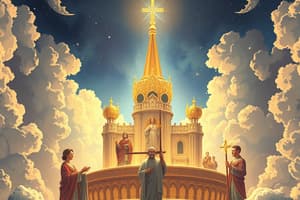Podcast
Questions and Answers
What is apostolic succession?
What is apostolic succession?
The uninterrupted passing on of apostolic preaching and authority from the Apostles directly to all bishops, accomplished through the laying on of hands when a bishop is ordained.
What is a covenant?
What is a covenant?
A solemn agreement between human beings or between God and a human being in which mutual commitments are made.
What is a creed?
What is a creed?
A short summary statement or profession of faith.
What is the Deposit of Faith?
What is the Deposit of Faith?
What is divine revelation?
What is divine revelation?
What is dogma?
What is dogma?
What does the Greek term 'logos' mean?
What does the Greek term 'logos' mean?
What is original sin?
What is original sin?
What is a patriarch?
What is a patriarch?
What does primeval history refer to?
What does primeval history refer to?
What is a prophet?
What is a prophet?
What is sacred tradition?
What is sacred tradition?
What is salvation history?
What is salvation history?
What is theophany?
What is theophany?
What was Vatican Council II?
What was Vatican Council II?
What is a vocation?
What is a vocation?
What is the Magisterium?
What is the Magisterium?
What is mortal sin?
What is mortal sin?
What does the term Trinity refer to?
What does the term Trinity refer to?
What is wisdom literature?
What is wisdom literature?
Flashcards are hidden until you start studying
Study Notes
Apostolic Succession
- Refers to the continuous transmission of apostolic authority from the Apostles to all bishops.
- Achieved through the sacrament of holy orders via the laying on of hands, as established by Christ.
Covenant
- A solemn agreement between individuals or between God and humanity, involving mutual commitments.
Creed
- A concise declaration of faith summarizing core beliefs.
Deposit of Faith
- The body of faith preserved in sacred scripture and tradition, originating from the Apostles.
- Underpins the Church's teachings as drawn by the Magisterium.
Divine Revelation
- God's self-disclosure to humanity, revealing His divine plan and mysteries.
Dogma
- Central church teachings recognized by the Magisterium, carrying full weight and authority.
Logos
- A Greek word meaning "word"; also refers to a logical appeal in rhetoric, one of Aristotle's three persuasive methods.
Original Sin
- The inherent fallen state of human beings inherited from the first sin.
Patriarch
- Denotes a father or leader of a family or tribe.
- Also refers to a highly respected elder.
Primeval History
- Pertains to the era before writing and historical record-keeping.
Prophet
- An individual chosen by God to communicate His messages, primarily focused on repentance for the Chosen People.
Sacred Tradition
- Derived from the Latin "tradere," meaning "to hand on," covers the initial oral proclamation of the Gospel by the Apostles, its written record in Scriptures, and its interpretation by the Magisterium guided by the Holy Spirit.
Salvation History
- Refers to God's saving actions throughout human history, culminating in the Paschal Mystery.
- Illustrates God's engagement with humanity, as expressed in the Old Testament and confirmed through Jesus Christ.
Theophany
- The visible manifestation of God to improve human comprehension of His nature; for example, God's appearance to Moses via the burning bush.
Vatican Council II
- The general council of the Roman Catholic Church convened by Pope John XXIII from 1962 to 1965.
Vocation
- God's call to all individuals in the Church to pursue a holy life, which may include ordained ministry, religious life, Christian marriage, or single living.
Magisterium
- The Church's authoritative teaching body, comprised of bishops in communion with the Pope.
Mortal Sin
- A grave offense that disrupts one's relationship with God.
Trinity
- Central Christian belief that God exists as three interrelated divine Persons: Father, Son, and Holy Spirit.
- A mystery understood through Divine Revelation beyond human reason.
Wisdom Literature
- Biblical texts deemed to impart wisdom, including Proverbs, Ecclesiastes, Song of Songs, Wisdom of Solomon, and Ecclesiasticus.
Studying That Suits You
Use AI to generate personalized quizzes and flashcards to suit your learning preferences.




